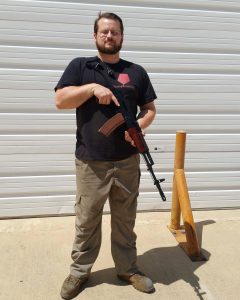At six-years-old, Bruce Dareing, from Denton, Texas, began learning how to clean and repair guns. He shot his first machine gun at the age of ten. Now, in the wake of the national gun debate — the motivation for the March for Our Lives Campaign in Washington on March 24th organised by student survivors of the recent shooting in Parkland, Florida — I was eager to have an honest conversation with someone on the fence, and find out about what the process of buying and selling guns actually involves.
“For me, being in the industry, any time that there’s an event like [the Florida shooting], my sales go up. Every single time. As a matter of fact, right now I am over a month behind on orders.
“The second Trump got elected I had very little sales for about three months because people (weren’t) worried about someone taking their guns away. Any time there’s an event like this, most people’s immediate response is, ‘Oh no, they’re gonna take my guns away.’”
I asked him if he thinks it’s possible to have a balanced view on the issue of gun regulation
Despite these precautions, executive director of the NRA Chris Cox said he has been assured of Trump’s strong support for the Second Amendment and that there would be no “gun control,” as of March 1st.
“One of the main problems that I have is with the NRA and their lobby to push back basically any and all regulations for guns. I mean, I’m sure if people let them have it their way they’d let people buy rocket launchers.”
Expanding on the process for gun regulation in America, Bruce explains: “Most of the government agencies like FBI and ATF, don’t have any type of universal database for everyone, so for instance, the state of Texas will have their records and there’ll be a federal record, and maybe another set of records held by another branch. You don’t always have an idea of who knows what, so it might show up in one system but not in another system.”
There is also the problem of mistaken identity. He tells me about a firefighter with an otherwise clean record, who was denied a firearm due to someone in the next county with the same name and a false security number one character different from his: “It showed him as being a criminal, even though he’s not. He got it fixed [with the] state right away, but it can take several years to get it fixed on the federal office [database]. So keeping all the records together can help prevent mistakes like that, which can be good and bad.”
As for the process of buying and selling guns at his shop: “We have an FFL (Federal Firearms License), so we have to go through a background check before we get issued that. The type-seven allows me to make, sell and repair firearms and ammunition. And of course, there’s different licenses for different things.
“Added to the type-seven is the Special Occupational Tax which allows us to buy, make and sell NFA items (E.g: machine guns). In order to buy that you have to go through a longer background check process and you have to get fingerprints, photo I.D, and everything is sent off to the ATF. A copy is given to the customer and then a copy is sent to the Head of Local Law Enforcement to let them know that ‘this person owns this gun,’ or ‘this suppressor.’ Say you wanted to walk in and get a handgun — a glock or whatever — you have to have photo I.D. from the state of Texas, you can’t get a handgun if you have an out-of-state license. So that’s number one. And if you want to buy a handgun you have to be 21 years of age.
“But once they’ve paid for it and we’ve got the serial number off of the gun, we fill out the background check forms, the customer fills out their information, we get a copy of their I.D, and then we call the FBI and they do their background check to say yes or no, ‘can the person have this gun.’ Once that gets approved and we get the confirmation number and identification of the person who gave us the ‘OK,’ we’re able to transfer that firearm to that person.”
I asked him if he thinks it’s possible to have a balanced view on the issue of gun regulation — can a person be pro-guns and also want restrictions in place that aren’t already there?
“Yes, and that’s how I would describe myself and my wife. We both believe strongly in the ability to have guns, as part of the constitution, however, there do need to be restrictions in place because there are people whom I personally am extremely happy cannot go and buy a machine gun. Like, I have one that I made, I can’t personally own it but my company can.”
For someone in Bruce’s field, the question of gun control isn’t so black-and-white, and misinformation can be frustrating.
“It’s kind of a difficult position to be in. There’s no real good way to keep a record of every single gun and where it is at all times because frankly there are just too many, and the current U.S law states you can actually make your own firearms and you don’t have to put a serial number on it or do anything to show that it’s yours, you can make it in your own home as long as you never sell it or give it away. It’s not illegal.”

